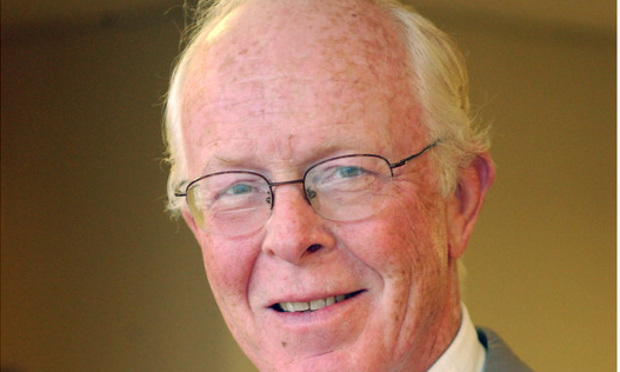Crotty Admonishes, but Won't Sanction, Former Collen IP Attorney
Judge Crotty said the repercussions for attorney Joshua Paul's actions sufficed as proper punishment.
March 14, 2018 at 05:51 PM
4 minute read
 Judge Paul Crotty.
Judge Paul Crotty. Despite excoriating a former Collen IP attorney for actions that were “a substantial departure from appropriate conduct,” U.S. District Judge Paul Crotty of the Southern District of New York declined to impose sanction being sought by the defendants in a suit over alleged counterfeit watches.
Crotty said that the “substantial repercussions” to attorney Joshua Paul and Collen, his former firm, had been sufficient as to serve the court's interests.
“The law firm has lost a client, and the lawyer has had to leave the law firm,” Crotty wrote. “Surely these serious consequences have to be taken into consideration when determining whether sanctions are appropriate and, if so, what sanctions to impose.”
The sanctions were part of a push by the defendants, landlords of a storefront on Manhattan's Canal Street, and their counsel, led by Dentons partner Avi Schick, to have Crotty reconsider its motion for summary judgment, which was scuttled, in part, by declarations made by Paul on behalf of clients, watchmakers Swatch and its subsidiary Omega.
Paul submitted signed affidavits from Bradford Cole, an investigator hired by Omega who was sent to purchase allegedly fake watches from the business occupied by the landlords. The statements of facts provided by Cole were cited throughout Crotty's December 2016 order denying summary judgment, in large part because Cole visited the store and said he had purchased a counterfeit.
That turned out not to be the case. A different person, working with Cole, had actually entered the store and purchased the watch. Later, during deposition by Schick's team, Cole himself confirmed he had not been in the store that day.
These and other falsehoods in the declarations submitted by Paul were raised on the eve of trial. At a hearing in mid-September, Crotty expressed concern that Paul had drafted the false declaration Cole had signed, and that he decided not to disclose that he knew about the issues to the court after learning about it in July. It was at that hearing that Crotty said he would “entertain motions to impose sanction … because of his role in drafting these affidavits.”
In deciding not to impose Rule 11 or Rule 16(g) sanctions, Crotty found Paul's actions after learning of the false declarations “[m]ore troubling” than the initial error. Crotty noted that the revelation came out of belatedly produced material, and Paul then resisted the deposition of Cole's colleague that led to the full understanding. Paul eventually admitted that he “consciously chose not to make a more candid disclosure to the court,” Crotty stated.
Yet Crotty, who cited the “guiding principle” behind sanctions as being no more severe than necessary to deter the same thing from happening again, said he felt what had already happened to Paul and his former firm sufficed. He added that Paul has never been disciplined in over three decades of practicing law.
“What happened here should be an object lesson to litigators about the care taken in preparing declarations and the obligation to disclose to the court serious factual discrepancies in their submissions,” Crotty said.
In a statement, Paul's attorney, Emery Celli Brinckerhoff & Abady partner Hal Lieberman, noted that his client had “a 32-year career vigorously and professionally advocating for his clients.”
“We are pleased that the judge confirmed that sanctions were not in order here,” Lieberman said.
On the issue of summary judgment, Crotty declined to provide the defendants all the relief they wanted. Of the two remaining charges, the fourth count, a New York Real Property Law claim, was disposed. Only the third count from the original complaint, a contributory trademark infringement claim, remains. Despite how it was acquired, there was enough credible evidence to allow the count to go forward, he said.
In a statement from a spokesman on behalf of the defendant landlord's parent company United American Land, the company said it did not “question the court's mercy,” despite the transgressions.
“We are glad that three of the four counts in the complaint have now been dismissed, and we are confident that we will prevail on the one remaining claim involving the supposed sale of a single watch,” the company said.
This content has been archived. It is available through our partners, LexisNexis® and Bloomberg Law.
To view this content, please continue to their sites.
Not a Lexis Subscriber?
Subscribe Now
Not a Bloomberg Law Subscriber?
Subscribe Now
NOT FOR REPRINT
© 2025 ALM Global, LLC, All Rights Reserved. Request academic re-use from www.copyright.com. All other uses, submit a request to [email protected]. For more information visit Asset & Logo Licensing.
You Might Like
View AllTrending Stories
Who Got The Work
J. Brugh Lower of Gibbons has entered an appearance for industrial equipment supplier Devco Corporation in a pending trademark infringement lawsuit. The suit, accusing the defendant of selling knock-off Graco products, was filed Dec. 18 in New Jersey District Court by Rivkin Radler on behalf of Graco Inc. and Graco Minnesota. The case, assigned to U.S. District Judge Zahid N. Quraishi, is 3:24-cv-11294, Graco Inc. et al v. Devco Corporation.
Who Got The Work
Rebecca Maller-Stein and Kent A. Yalowitz of Arnold & Porter Kaye Scholer have entered their appearances for Hanaco Venture Capital and its executives, Lior Prosor and David Frankel, in a pending securities lawsuit. The action, filed on Dec. 24 in New York Southern District Court by Zell, Aron & Co. on behalf of Goldeneye Advisors, accuses the defendants of negligently and fraudulently managing the plaintiff's $1 million investment. The case, assigned to U.S. District Judge Vernon S. Broderick, is 1:24-cv-09918, Goldeneye Advisors, LLC v. Hanaco Venture Capital, Ltd. et al.
Who Got The Work
Attorneys from A&O Shearman has stepped in as defense counsel for Toronto-Dominion Bank and other defendants in a pending securities class action. The suit, filed Dec. 11 in New York Southern District Court by Bleichmar Fonti & Auld, accuses the defendants of concealing the bank's 'pervasive' deficiencies in regards to its compliance with the Bank Secrecy Act and the quality of its anti-money laundering controls. The case, assigned to U.S. District Judge Arun Subramanian, is 1:24-cv-09445, Gonzalez v. The Toronto-Dominion Bank et al.
Who Got The Work
Crown Castle International, a Pennsylvania company providing shared communications infrastructure, has turned to Luke D. Wolf of Gordon Rees Scully Mansukhani to fend off a pending breach-of-contract lawsuit. The court action, filed Nov. 25 in Michigan Eastern District Court by Hooper Hathaway PC on behalf of The Town Residences LLC, accuses Crown Castle of failing to transfer approximately $30,000 in utility payments from T-Mobile in breach of a roof-top lease and assignment agreement. The case, assigned to U.S. District Judge Susan K. Declercq, is 2:24-cv-13131, The Town Residences LLC v. T-Mobile US, Inc. et al.
Who Got The Work
Wilfred P. Coronato and Daniel M. Schwartz of McCarter & English have stepped in as defense counsel to Electrolux Home Products Inc. in a pending product liability lawsuit. The court action, filed Nov. 26 in New York Eastern District Court by Poulos Lopiccolo PC and Nagel Rice LLP on behalf of David Stern, alleges that the defendant's refrigerators’ drawers and shelving repeatedly break and fall apart within months after purchase. The case, assigned to U.S. District Judge Joan M. Azrack, is 2:24-cv-08204, Stern v. Electrolux Home Products, Inc.
Featured Firms
Law Offices of Gary Martin Hays & Associates, P.C.
(470) 294-1674
Law Offices of Mark E. Salomone
(857) 444-6468
Smith & Hassler
(713) 739-1250










